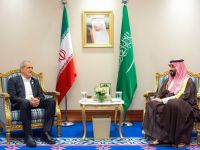A Taliban decision on whether to extradite Osama bin Laden ultimately rests with supreme leader Mullah Mohammad Omar, a one-eyed recluse who is reportedly married to the Saudi dissident's eldest daughter.
And the most powerful man in Afghanistan, who was due Monday to receive a delegation of Pakistani officials sent to persuade him to hand over the alleged terrorist, has never given the slightest indication that he is prepared to abandon his former comrade-in-arms from the days of the resistance to the 1979-89 Soviet occupation.
Last week the Taliban leader dismissed US allegations against bin Laden as a smokescreen for the failure of their intelligence services to prevent last week's tragedy.
Despite this power, very little is known about the stockily-built Muslim cleric known as the Amir-ul-Momenin, or commander of the faithful.
Aged in his early 40s, he leaves almost all contact with the outside world to Foreign Minister Wakil Ahmad Mutawakel, although he has granted occasional audiences to visitors from China or the UN.
Friends say he lives modestly, albeit in a large house built for him by bin Laden, and calls himself a "servant of Islam." He is said to preside over meetings with key ministers from his bed, sometimes issuing instructions on pieces of scrap paper.
A virtual recluse, he rarely leaves Kandahar although it is possible he could make an exception to that rule on Tuesday, when a council of up to 1,000 elders and Islamic scholars from each of Afghanistan's 32 provinces is due to meet in Kabul.
Up for discussion will be a fatwa declaring jihad, or holy war, against the United States.
According to Yossef Bodansky, author of a book on bin Laden, the bond between him and Omar has been a family one since 1998, when Omar took bin Laden's eldest daughter as one of his wives. Since then bin Laden has himself taken a fourth wife, a woman some believe to be Omar's daughter.
Omar's refusal to hand over his friend has won him support among radical Islamic groups but has brought his impoverished country almost complete diplomatic isolation.
A group commander in the Afghan Mujahedeen, Omar lost an eye in the anti-Soviet campaign before rising to prominence in 1994 at a time of chaos and infighting between the disintegrating factions of the anti-Soviet alliance.
At the peak of the anarchy, Omar's efforts to restore order and justice according to Islamic Sharia law won him and his talibs (religious students) the support of ordinary Afghans.
Tales of the talibs freeing children from the rapacious clutches of local warlords helped build his reputation and within two years Omar had established himself as Afghanistan's most powerful commander and the pre-eminent theological authority in the land.
His Taliban fighters, allegedly supported by Pakistan and indirectly by the United States, swept into Kabul in 1996 and now control 90 percent of the country.
In August 1999, Omar survived what appeared to be an assassination attempt when a truck blew up in Kandahar and killed several of his bodyguards.
But his authority in the Taliban-controlled part of Afghanistan now appears to be unchallenged and the seat of power has effectively shifted from Kabul to Kandahar.
Omar was educated in religious schools but his studies were cut short when he joined the jihad against the Soviet invasion of Afghanistan in 1979.
After the Soviet forces withdrew a decade later he began a radical Islamic movement from his school in his native village of Singesar, in southern Afghanistan.
Their aim was to restore order, enforce Islamic Sharia Law and defend Afghanistan. Afghan refugees sheltering in Pakistan joined as talibs and the movement grew quickly.
Although radical Islamic groups in Pakistan support Omar's Taliban, his policies have earned worldwide condemnation and his regime is not recognized by the Organization of the Islamic Conference.
Under his strict interpretation of Islamic law, women are virtually prisoners in their homes, forced to wear all-enveloping clothing, or burqas, when they are allowed outside. Men are forced to grow beards.
Photography of living beings is banned, the hands of thieves are amputated, murderers are publicly executed by victims' families, homosexuals are crushed under brick walls and female adulterers are stoned to death -- KABUL (AFP)
© 2001 Al Bawaba (www.albawaba.com)







